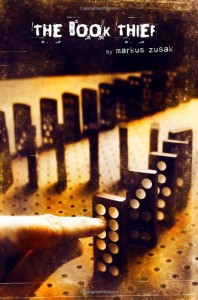Meeting Joe Black

I am haunted by humans.
I've only read a handful of Nazi books but I'm recognizing some patterns, some stereotypes coming into them. you know how things will end for most of the protagonists. Most of the time. And you know it will trigger some guilt on your part for the things you are taking for granted, it will hit you somewhere deep with the awful-wonderful spectrum of the human nature that brings along some celebration in your heart sometimes and unfathomable horror in others.
And as a byproduct, you will cry.
The Book Thief is almost a stereotypical YA Nazi book, except its about a small fictional town in Germany and its poor, simpleton inhabitants. At the beginning of the novel, Liesel Meminger is brought to her new home along 33 Himmel Street, with an accordion player slash painter foster father and a mother with poor cooking skills and a fondness for filthy words.
In 1933, 90 percent of Germans showed unflinching support for Adolf Hitler. That leaves 10 percent who didn't.
So in that aspect, yes, this is a point of view that deserves to be read. This book belongs right beside Ruta Sepetys' Between Shades of Gray and at certain points they are almost perfect parallels from opposite poles of each other: The young heroine, her family, her best friend who happens to be a boy and the community of people war has built around them.
To have this story told by an intangible and omniscient narrator such as death brings about a perspective of both gravitas and impartiality. To him everyone's just "the humans": The Fuhrer, The Jews, the (German) people of Himmel Street. No one gets vilified or sanctified, he's just doing his job and telling you a story.
I have given you two events in advance, because I don't have much interest in building mystery. Mystery bores me. It chores me. I know what happens and so do you. It's the machinations that wheel us there that aggravate, perplex, interest and astound me.
Yeah, sometimes I'm okay with this, but this book taught me that in this genre (the YA Nazi book genre), I wouldn't mind the mystery. I know what happens but I am a hopeful reader. Reflexively, I am hoping that I am being told a story that's outside the curve, that I'm seeing a small footnote in history, a statistic. Everything else, you have the history books for, right? And Death isn't really fond of spoiler tagging his thoughts (I mean, the first page he pretty much tells you what we already know) so you might have to be ready for that if you pick this up because that was an issue for me. There's an image in my mind that he's occasionally popping in a scene that's supposed to be some foreshadowing something in the future and then everyone freezes and Death walks in telling me, 'yeah, this scene is important, remember this scene because lttle does this person know that this little act will save/kill him/her a little further on. Oh sorry, you can go back to reading now and feel those feels you were having.'
It takes a bit of getting used to (I'm actually wondering if I even got used to it) and some will probably find this annoying (just as I did at certain intervals).
So that's the meat of this book: a collection of seemingly random vignettes in the life of Liesel, her family, Max and the people of Himmel Street building to a spoilered sad climax. There were stretches that felt draggy to me (the book thieving business just felt a little drawn out) and some plot devices too gimmicky and contrived (I was not a fan of the dictionarying). It was like a contest between me and the narrator where he's setting up the pieces to ensure my tears and I'm all adamant and cocky that he will not get to me, that I will most definitely NOT cry. He almost got to me with The Standover Man I am on to his not-so-subtle emotional manipulations, I already know where this is going and I cannot be hoodwinked into tears.
I hated reading that part again because I still got the scratchy feeling in my throat now. It was a lengthy, ugly cry for me (I am seriously losing count of the books that made me cry this year), with burning puffy eyes reading beautifully crafted, shamelessly manipulative words that takes no prisoners, doles out no mercy. I was aware some emotional exploitation was going on and some dialogue got over the top drama, the kind I usually sneer at and berate in reviews. But this time I can't. Because beyond THAT tipping point I could only watch helplessly as I lose to the machinations of this book. Machinations I can see through but I end up relenting.
You will either yield willingly or, like me, resist with your pride and smugness. Either way it will be brutal when this book finally slays you.
 8
8








